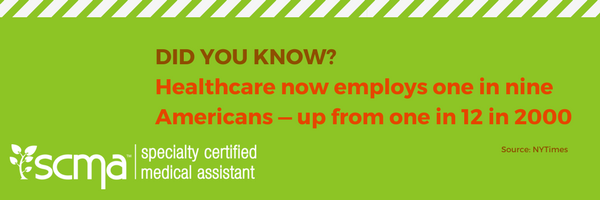So you've invested hard work, time and money to improve your job market value in the healthcare industry. You think you're ready for a promotion or qualified for your dream job. What's next?
It's only logical you caddy your credentials all the way to having a hiring officer or a superior choose your resume from piles of others they go through in their search for the best candidate. This means that for those who overlook the value of an optimally-formatted resume, the oversight may undermine their chance of being invited to a job interview and landing the job for which they're qualified.
According to the U.S. Bureau of Labor Statistics, employment of medical assistants is projected to grow 23 percent from 2014 to 2024, much faster than the average for all occupations. The growth of the aging baby-boom population will continue to increase demand for preventive medical services, which are often provided by physicians. As their practices expand, physicians will hire more assistants to perform routine administrative and clinical duties, allowing the physicians to see more patients.

Aiming for a Promotion? Consider a specialty certification:
Cardiology | Dermatology | Endocrinology | Family Medicine | Geriatrics | Internal Medicine | OB/GYN | Oncology | Orthopedic Surgery | Pediatrics | Transplantation Surgery | Urology | Women's Health |
Before you send out your resume, take time to review Resume 101:
1. Naming your resume right
You're better off including your own name on your CV's file name than saving it as a generic "resume.doc". Make it easier for hiring managers to keep track of your job application documents.
2. Font Use
Limit your use to 2 or 3 fonts at most. Anything beyond that is too busy. Opt for conventional font types and peg the font size at 11-12 points maximum. Going beyond 13 points makes your document appear like grade school work.
3. Understanding the Word or PDF debate
There are pros and cons to each choice for resume format. Portable document formats or PDFs may faithfully preserve your formatting and layout. Some applicant tracking systems (ATS) overlook PDF forms while others can't handle ".docx" files.
On the other hand, if a resume is formatted in one version of Microsoft Word, you can't be sure the person looking at your resume has the same version. Depending on the software used on the other end, your resume can actually turn out differently than planned. Your formatting could be stripped out anyway.
A good rule is to first check if the company or recruiter has a preference for certain file formats. Have a back-up or an alternate format on hand, including one in a Rich Text Format (RTF) in case you need to copy and paste information that conforms to a company's application process protocol.
4. Creating a new folder per job application
For the same reason cited in #3, save your application documents in a per-company/per-recruiter folder so you can also keep tabs on your job search correspondence.
5. Using bullets over blocks of text
Recruiters devote anywhere from 15 seconds to a minute (it its impressive enough) per resume. Make your selling points easy to spot and do away with big blocks of text. Limit yourself to 3-5 bullets and try to be as concise as you can be without leaving relevant details.
6. Trying to work within a 1-page CV
This is another often-debated issue. However, unless we're speaking of a work experience going beyond 10 years, a second page may actually be more a handicap than an advantage. If you must, then just be sure make every word and bullet point count.
7. Deleting "References Available upon Request"
Recruiters will ask you for one if they really need it. You're better off using that space for something else like focusing on your list of medical assistant skills (administrative, medical records management software, medical skills, patient interaction skills, etc.) to show your future employer that you did a good job in a previous company.
8. Deleting Birthdate, Marital Status or Religion
At least in the U.S., the Equal Employment Opportunity Commission enforces the Civil Rights Act of 1964. As such, having these factors (including sex and national origin) influence a candidate's chance of being hired is actually considered discrimination.
9. Deleting your GPA as well as other college details
Same goes for hobbies, organization memberships and extra-curricular activities. Unless we're talking about you graduating summa or magna cum laude or you're just fresh out of school, these are unnecessary text that may just draw the recruiters' eyes away from the meat of your resume.
For example, your potential employer would prefer learning more about externship, where emphasis is placed on the related coursework or skills one acquired during the course of the medical assistant training program.
10. Editing your skills set
"Microsoft Word" has been a minimum workplace expectation for the longest time. Adding this actually paints you more as a mediocre candidate. Avoid something that generic and highlight what would be more relevant to your potential employer, e.g., your familiarity with a medical records management software.
Include volunteer work that hone skills set relevant to the nature of business of the company you want to join. Better yet, provide more details on your soft and hard skills list of medical assistant skills.
11. Never using "I"
Doing so only makes you appear unprofessional. You don't even have to use full sentences, let alone make your CV appear like an autobiography. Besides, recruiters tend to focus more on whether you're a fit in their company's culture. There's nothing wrong with confidence for as long as you remember that you're only as good as your ability to work as part of a team.
12. Deleting overused buzzwords and jargon.
Let's face it, each of us will differ with our definitions of what these phrases below actually mean anyway. You're better off getting straight to the point when you describe yourself. Watch out for cliche phrases like:
- think outside of the box
- synergy
- go-to person
- go-getter
- hard worker
- thought leadership
- value added
- positive attitude
- results-driven
- team player
- bottom line
- strategic thinker
- dynamic
- self-motivated
- detail-oriented
- proactive
- track record
- quick learner
 844.885.1476
844.885.1476



